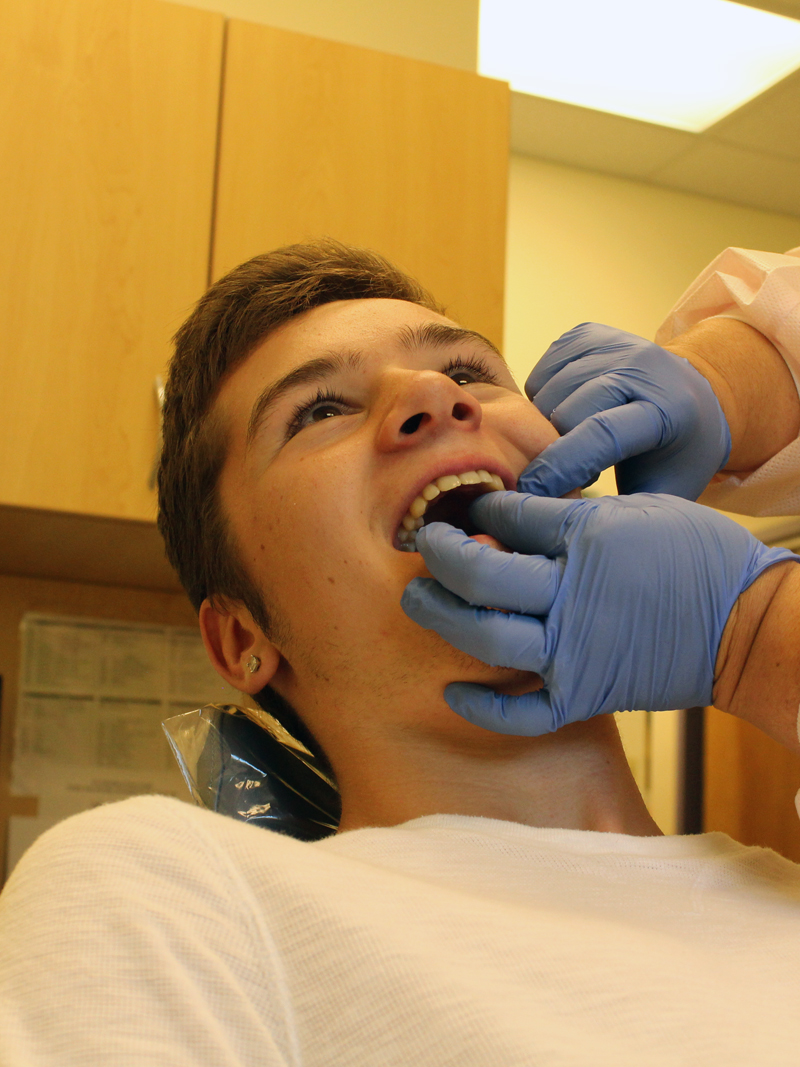Adolescent Dental Health

Mouth Guards
When a child begins to participate in recreational activities and organized sports, injuries can occur. A properly fitted mouth guard or mouth protector, is an important piece of athletic gear that can help protect your child’s smile, and should be used during any activity that could result in a blow to the face or mouth.
Mouth guards help prevent broken teeth and injuries to the lips, tongue, face or jaw. A properly fitted mouth guard will stay in place while your child is wearing it, making it easy for them to talk and breathe.
Pre-made sport guards can be purchased at sporting goods stores or a custom fitted one may be made by the dentist.
Beware of Sport Drinks
Due to the high sugar content and acids in sports drinks, they have erosive potential and the ability to dissolve even fluoride-rich enamel, which can lead to cavities.
To minimize dental problems, children should avoid sports drinks and hydrate with water before and after sports. Be sure to talk to your dentist before using sports drinks.
If sports drinks are consumed:
- reduce the frequency and contact time
- swallow immediately and do not swish them around in the mouth
- neutralize the effect of sports drinks by alternating them with sips of water
- rinse mouth guards only in water
- seek out dentally friendly sports drinks
Mouth Piercing – Is It Really Cool?
You might not be surprised anymore to see people with pierced tongues, lips or cheeks, but you might be surprised to know just how dangerous these piercings can be.
Common symptoms after piercing include pain, swelling, infection, an increased flow of saliva and injuries to gum tissue. Difficult to control bleeding or nerve damage can result if a blood vessel or nerve bundle is in the path of the needle.
So follow the advice of the American Dental Association and give your mouth a break – skip the mouth jewelry.
Tobacco – Bad News in Any Form
Tobacco in any form can jeopardize your child’s health and cause incurable damage. Teach your child about the dangers of tobacco.
Smokeless tobacco, also called Spit, Chew or Snuff, is often used by teens who believe that it is a safe alternative to smoking cigarettes. This is an unfortunate misconception. Studies show that spit tobacco may be more addictive than smoking cigarettes and may be more difficult to quit. Teens who use it may be interested to know that one snuff per day delivers as much nicotine as 60 cigarettes. In as little as three to four months, smokeless tobacco can cause periodontal disease and produce pre-cancerous lesions called leukoplakia.
If your child is a tobacco user you should watch for the following that could be early signs of oral cancer:
- A sore that won’t heal.
- White or red leathery patches on the lips and on or under the tongue.
- Pain, tenderness or numbness anywhere in the mouth or lips.
- Difficulty chewing, swallowing, speaking or moving the jaw or tongue; or a change in the way the teeth fit together.
Because early signs of oral cancer usually are not painful, people often ignore them. If it’s not caught in the early stages, oral cancer can require extensive, sometimes disfiguring, surgery. Even worse, it can kill.
Vaping (e-cigarettes)
This poses harmful oral effects. E-cigs automatically convert nicotine into vapor. Nicotine is a vasoconstrictor compound, which means that it has the tendency to stimulate the contraction of the muscular wall of the blood vessels, resulting in reduced blood flow. Based on research, the extended decrease of nutrient and oxygen supply to the gum increases the probability of periodontal (gum) disease development. Restriction of blood flow also affects the mouths natural inhibitory function of cleaning and fighting bacteria, as well as reduces the body’s innate ability to heal and generate new cells.
Signs and Symptoms of Periodontal Disease
- Persistent bad breath
- Inflamed or bleeding gums
- Redness, tenderness, or swelling of gums
- Loose or wobbly teeth
- Gum recession
- Tooth loss
Help your child avoid tobacco in any form. By doing so, they will avoid bringing disease and cancer-causing chemicals in direct contact with their tongue, gums and cheeks.

